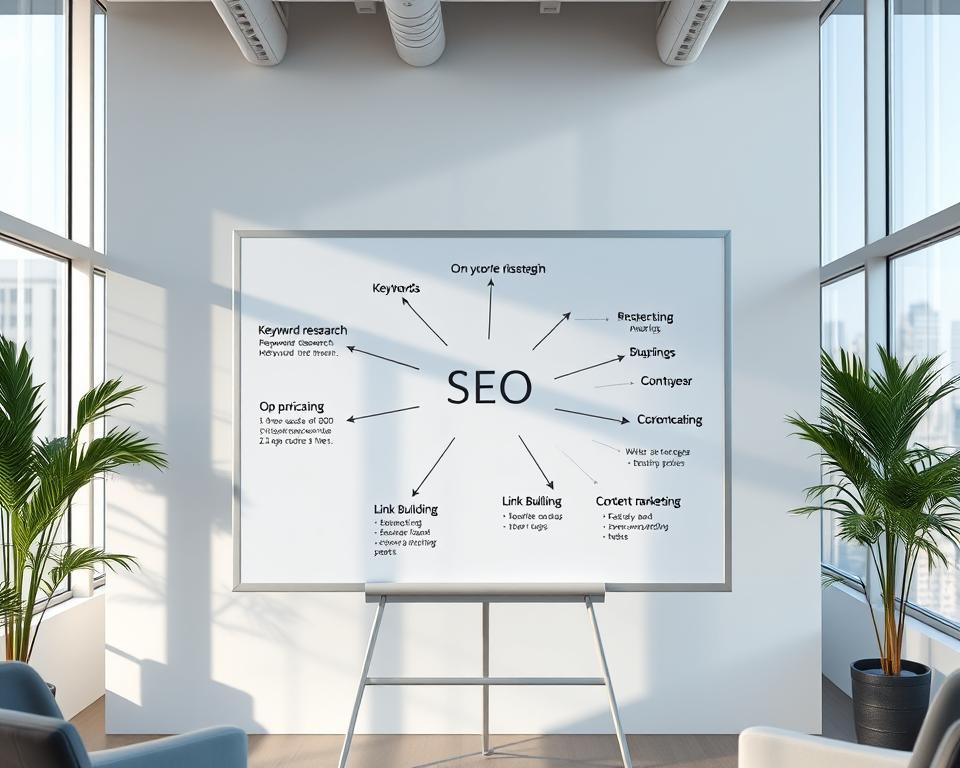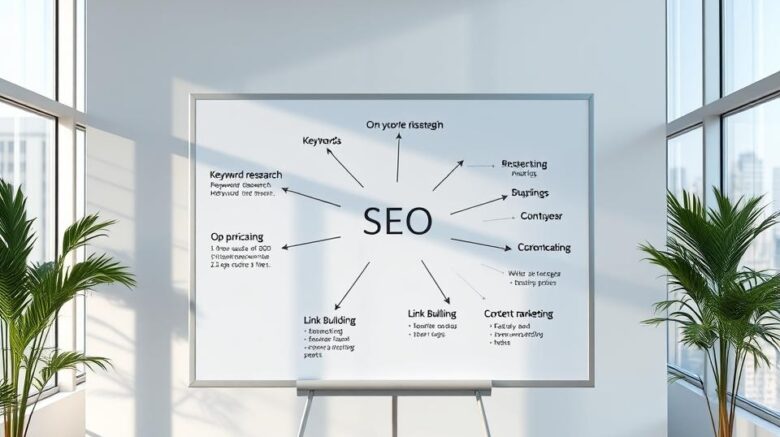1on1 Marketing: Unlock Personalized Customer Engagement.
Have you ever wondered why certain brands click with their audience while others fall flat? The secret lies in 1on1 Marketing, a game-changing method that turns generic marketing into personalized experiences. By dialing into personal preferences, it forges a bond that mass marketing simply can’t replicate. This approach shifts the focus from mass marketing to tailored strategies that speak directly to each customer’s heart.
By adopting 1on1 Marketing, businesses can build more meaningful connections. They can craft marketing plans that truly resonate with their audience. This section explores the core of 1on1 Marketing, showing how it enables brands to engage with customers on a more personal level, company website.
Marketing Strategy Evolution
Over time, the marketing landscape has undergone a dramatic shift. At first, marketers relied on broad-brush strategies aimed at average customers. Now, the demand is for engagement through tailored conversations. This shift emphasizes the need to understand each customer as an individual, not just part of a group.
With marketing’s evolution, it’s clear that generic tactics fall short. Today’s methods aim on building real relationships rather than simply pushing products. Marketers now use data insights to inform their approach, moving towards personalized tactics that meet unique customer needs.
This evolution not only deepens customer connections but also boosts brand loyalty and retention. In a world where consumers face endless choices, brands that offer personalized experiences stand out. They create platforms for dialogue and engagement, ensuring customers feel appreciated.

| Strategy Type | Characteristics | Example |
|---|---|---|
| Generic Approach | Broad messaging, wide reach | Mass email blasts |
| Personalized Engagement | Individual focus, fine-tuned reach | Segmented email flows |
Personalization’s Role in B2B
As B2B marketing evolves, personalization is indispensable. Professionals seek to improve conversions via personalized 1on1 strategies. Studies show that many see this method as key to keeping customers. In a rapid-fire environment, engaging audiences effectively is crucial.
Personalized marketing tackles the challenge of grabbing attention. It makes sure messaging aligns with each individual’s tastes. This focus on individual experiences helps brands stand out in crowded markets.
As touchpoints multiply, the demand for personalization grows. Companies embracing tailored tactics address needs and forge lasting bonds. This approach can give a significant edge in the competitive market today.
Understanding 1on1 Marketing
One-to-one marketing is about tailoring experiences to meet each customer’s unique needs. It leverages data insights to design personalized engagement tactics. By concentrating on individual experiences, it fosters robust customer bonds.
Imagine a cafe where the barista remembers your go-to order—this is one-to-one Marketing in action. This simple gesture demonstrates how attending to preferences drives satisfaction. It transforms a routine purchase into a memorable experience, enhancing loyalty.
Implementing one-to-one Marketing requires a deep dive into customer data. They analyze behaviors and preferences to tailor their messages. This ensures their marketing efforts connect with individual tastes, leading to stronger customer connections and higher satisfaction.
As companies pursue personalized engagement, they recognize that customization underpins lasting success. Those mastering bespoke experiences gain substantial rewards.
Why Personalized Engagement Pays Off
Personalized customer engagement brings numerous benefits to modern brands. It significantly boosts customer satisfaction by providing tailored experiences that meet individual preferences and needs. Studies show that 80% of consumers prefer to buy from brands that offer personalized interactions. This highlights the significant impact of customized marketing.
Personalized loyalty programs drive retention. By targeting distinct pain points and tastes, companies foster a sense of being valued. This connection fosters repeated purchases, driving profitability.
Tailored marketing yields better conversion rates. Custom suggestions and targeted messaging steer customers from consideration to purchase. Highlighting the benefits of personalized marketing enhances brand perception and positions businesses for success in a competitive market.
| Benefit | Description | Impact |
|---|---|---|
| Customer Satisfaction | Personalized experiences improve overall customer happiness. | Higher chances of repeat purchases. |
| Loyalty Programs | Custom offers boost customer engagement. | Stronger retention and brand loyalty. |
| Sales Upsurge | Targeted content spurs customer actions effectively. | Boost in sales and revenue. |
Hurdles to Personalized Marketing
Brands face numerous hurdles when aiming to implement personalized marketing. Collecting quality data is a primary obstacle. High-quality data is key for segmenting audiences effectively. Without this, campaigns miss the mark, squandering opportunities and resources.
Brands targeting specific audiences must navigate the fine line between personalized and generic communication. Big enterprises struggle to keep a personal touch amid heavy automation. This can result in losing the personal touch that customers cherish. – Marketing 1on11on1 official company website
Smaller businesses also have their own set of challenges. They may lack clear messaging, hindering their personalization efforts. Acknowledging these hurdles is crucial for refining strategies and boosting engagement.
Tools Fueling Personalized Marketing
Groundbreaking technologies in marketing are reshaping the realm of personalized customer engagement. CRM systems are pivotal for managing customer data. They help businesses manage customer data, vital for creating tailored marketing experiences. A robust CRM system allows companies to grasp customer preferences and behaviors more deeply.
AI amplifies personalization with precise targeting and automation. Machine learning algorithms sift through vast datasets to uncover trends and consumer behaviors. This enables strategy refinement. Such automation cuts down on manual work and boosts the effectiveness of marketing campaigns.
Studies reveal that 72% of marketers focus on CRM systems for personalization. 55% use automation tools to streamline campaigns. These technologies empower businesses to offer customized experiences on a large scale. They ensure campaigns connect with individuals rather than broad audiences.
Merging these tools creates a dynamic engagement framework. The rapidly changing landscape prompts marketers to embrace advanced tools. These tools not only improve efficiency but also strengthen connections with their audiences.
Personalization Best Practices
Successful personalization rests on core best practices. These ensure that efforts resonate with the audience, leading to better engagement. Key components include:
- Segmenting Your Audience is essential for targeting specific groups based on common traits. This method allows for more precise messaging, boosting engagement rates significantly.
- Using refined communication improves the customer experience. Consistent, relevant communication across channels builds trust and encourages continued interaction.
- Adopting testing strategies, like A/B testing, is critical. It helps pinpoint the most impactful marketing approaches by comparing different messages and metrics.
Leveraging customer data is crucial to grasp behaviors and preferences. Regular analysis refines strategies. Following these practices enables brands to develop personalization that truly resonates with their audience.
Creative Ways to Personalize
Innovative tactics improve personalization across all touchpoints. Brands now use personalized emails that match individual tastes, making messages more impactful. Analyzing purchase history allows spot-on product suggestions, driving sales.
Segment-specific videos are another smart tactic. It grabs attention and builds a strong emotional bond between the brand and its audience. Adaptive loyalty programs that align with behaviors reward meaningful interactions, enhancing the journey.
| Creative Tactic | Description | Benefit |
|---|---|---|
| Tailored Emails | Emails designed to individual preferences and behaviors. | Boosts engagement and conversion rates. |
| Suggested Products | Suggestions based on previous purchases and browsing history. | Boosts sales and customer satisfaction. |
| Segmented Videos | Video content customized for specific segments. | Strengthens brand connection and engagement. |
| Loyalty Programs | Rewards systems that adapt to individual behaviors. | Drives loyalty and repeat business. |
Companies gain significantly by weaving customized offers into social media, email, and app alerts. Every touchpoint is an opportunity to demonstrate commitment to personalized engagement. It creates memorable experiences, making brands stand out in a crowded landscape.
Future Trends in 1on1 Marketing
The world of 1on1 marketing is rapidly changing, driven by the latest marketing trends. Marketers will use AI to create personalized campaigns that meet individual needs. It enhances campaign outcomes and strengthens connections by delivering timely, relevant content.
Omnichannel experiences are another key trend. Customers now expect a smooth journey across different platforms, from social media to emails. Brands must maintain uniform messaging to satisfy these demands. Understanding where and how customers interact helps create a unified experience, strengthening brand loyalty.
In response, ethical data usage will be vital for preserving consumer trust. Amid rising privacy concerns, transparency and responsibility in data handling are non-negotiable. Focusing on ethical data usage not only meets regulatory standards but also builds stronger customer relationships, leading to increased loyalty in the future of 1on1 marketing.
